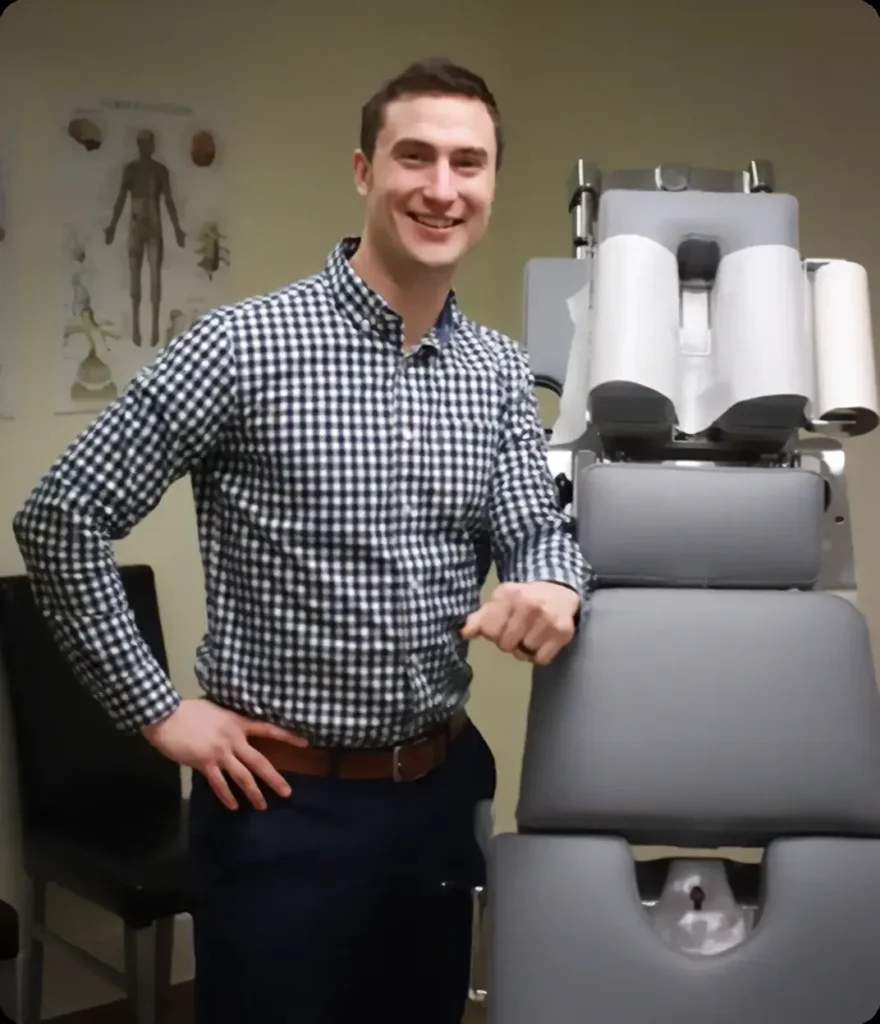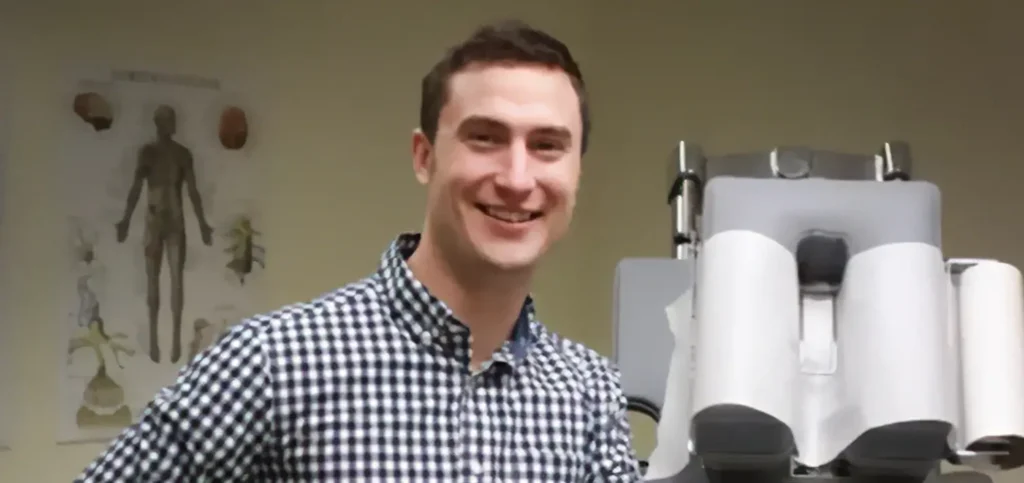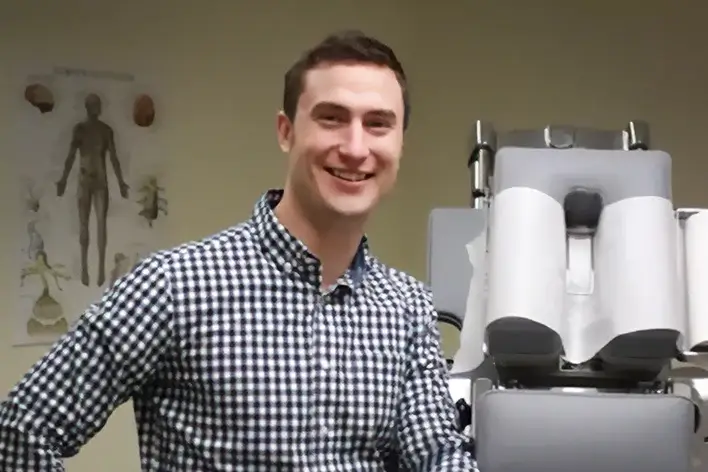TMJ Chiropractor
What is TMJ Disorder?


Causes of TMJ Disorders
- Displaced or damaged joint disc. The small disc between the jawbone and skull can shift or wear down, messing up the smooth movement of the joint.
- Soft tissue strain. Overuse, poor posture, or sudden movements can strain the ligaments and tissues supporting the joint.
- Arthritis. Degenerative conditions like osteoarthritis or rheumatoid arthritis can break down cartilage inside the joint, causing pain and stiffness.
- Trauma or injury. A direct impact to the jaw, like from an accident or fall, can damage the joint or surrounding areas.
- Muscle spasms. Tension or overactivity in the jaw muscles can cause painful spasms and limit jaw movement.
Symptoms of TMJ Disorders
Tension from the jaw can go downward, causing soreness or stiffness in the neck.
TMJ may trigger tension-type headaches or contribute to migraine-like pain.
Teeth may feel sore or sensitive because of uneven bite pressure or muscle strain.
Pain can be felt directly in the temporomandibular joints on one or both sides.
The joint can become stuck in an open or closed position, making movement difficult.
Some people experience a dull ache, pressure, or fullness in or around the ear.
Pain or sensitivity may happen when touching the jaw or during simple movements.
Persistent soreness or a dull ache can affect the cheeks, temples, or lower face.
Biting or chewing may feel painful or uneven because of the joint.
Strain and tension from TMJ issues can go upward, causing pressure or aching near the eyes.
Benefits of Chiropractic Care for TMJ
TMJ chiropractic adjustment is a safe approach to managing TMJ disorders without relying on medication or invasive procedures. By correcting alignment issues in the jaw, neck, or spine, TMJ chiropractor helps lower pressure on the temporomandibular joint and surrounding muscles. This can help relieve pain and help your jaw move better.
Patients can also get customized treatment plans from a chiropractor for TMJ that may include targeted exercises, lifestyle guidance, and at-home care like heat or ice. With a consistent chiropractor for jaw pain care, you can see your jaw work better, with fewer aches, and a better quality of life – especially when treatment focuses on the cause of the problem.




Effective Solutions for Managing TMJ Disorder at Payson Salem Chiropractic
At Payson Salem Chiropractic, our jaw pain chiropractor treats TMJ disorders by focusing on real, lasting results – not just short relief. Our chiropractic care for TMJ plans are built around your unique needs. We use our treatments to help your jaw work properly and lower pain. Are you dealing with jaw pain, tension headaches, or related symptoms? We’re here to help you restore naturally with our professional chiropractic treatment for TMJ.
We also specialize in chiropractic for neck pain and offer care from a chiropractor for migraines. So we’re a trusted choice for full-body pain relief when you need it.
Book your chiropractic services consultation today to see how our care can help you feel better.
Need a TMJ Chiropractor? We Can Help
Discover how expert care can bring you real relief. Book your appointment today and take the first step toward feeling better
Review about
TMJ Chiropractor in Payson, UT
Posted onTrustindex verifies that the original source of the review is Google. Dr. Jon Krogue has some of the best bedside manner, touch, energy and tone about him. He is compassionate, kind and did such a great job adjusting my wrists, ribs, hips, back, neck, ankles and toes! I would whole heartedly trust him to adjust my children if I had any. Though, personally I'm not sure if I'll be going back regularly for myself because although he did his best to make sure I felt taken care of, I felt rushed. I love that Dr. Jon knows his value and what his amazing adjustments are worth. As a nearly retired LMT of 10 years, I have been paid $15 for an hours work of manual labor at Massage Envy too often, and now my body is paying for it. I would definitely go back Dr. Jon if I needed him to give me a hand fixing something that I felt was really bothering me. I'm looking for a very in depth treatment, and am now convinced that I might only be 100% $atisfied with my experience if I take a trip to Florida to meet the amazing Dr. Mondragon. Talk about expensive! Anyways, FIVE STARS! Thank you so much Jon, I'll see you when I see you.Posted onTrustindex verifies that the original source of the review is Google. Dr. Krogue at Payson Salem Chiropractic is the only Chiropractor that has been able to adjust my neck and I don’t get a headache afterwards.Posted onTrustindex verifies that the original source of the review is Google. I've had a fantastic experience with Dr. Krogue at Payson Salem Chiropractic. He's knowledgeable, skilled, and genuinely cares about his patients. Appointments are easy to schedule, run on time, and he's very accommodating. Most importantly, I'm feeling a real difference—my pain is subsiding, and I finally feel like I'm on the right track to recovery. I highly recommend Dr. Krogue to anyone seeking effective, compassionate chiropractic care!Posted onTrustindex verifies that the original source of the review is Google. This is my first experience with a chiropractor, and I am very happy with the results! Dr. Krogue’s Adjustments are Very gentle but effective! I don’t think my posture has been this improved for years!Posted onTrustindex verifies that the original source of the review is Google. Jon is the best! He is not only amazing for my health, but also my young kids. I brought my 5 year old daughter in, and he was so great! she was afraid to get on the table, but by the time he was done, she was excited to come back :D And on top of that, he knows the human body so well. I had a shoulder injury that was giving me trouble, and he quickly gave expert tips and exercises for me to do. and they helped a ton. Overall, he is simply amazing.Posted onTrustindex verifies that the original source of the review is Google. Great visit! Extremely thorough and great at what he does! Would recommend to anyone!Posted onTrustindex verifies that the original source of the review is Google. Dr. Kroger is friendly and professional.Posted onTrustindex verifies that the original source of the review is Google. He was kind and very thorough. He found the area on my back that was hurting and targeted it. It was great. Highly recommend.
FAQs About TMJ Chiropractor in Payson, UT
Can a Chiropractor Help With TMJ?
Yes, chiropractors can help with temporomandibular joint (TMJ) disorder by using gentle adjustments and therapies that may reduce pain, improve jaw mobility, and relieve tension in the surrounding muscles.
What Does a Chiropractor Do for TMJ?
A chiropractor helps with temporomandibular joint (TMJ) disorder by assessing the condition, performing gentle adjustments and soft tissue therapy, correcting posture, prescribing exercises, and providing lifestyle guidance to reduce strain and improve jaw function.
They may also use supportive therapies like heat or electrical stimulation and, when needed, collaborate with dentists or other specialists to create a comprehensive treatment plan, making chiropractic care an effective adjunct for managing TMJ symptoms.
Can Neck Alignment Cause TMJ?
Yes, poor neck alignment can contribute to temporomandibular joint (TMJ) disorder by creating muscle imbalances and postural strain that affect the jaw’s position and function.
Forward head posture and tight or weak muscles in the neck and shoulders can place additional stress on the jaw joint, increasing the risk of misalignment, discomfort, and TMJ pain.
How to tell if TMJ is out of alignment?
You can tell your temporomandibular joint (TMJ) may be out of alignment if you have pain in the jaw, teeth, or ears, difficulty chewing, or notice that your bite feels uneven and your teeth do not line up properly.
Other common signs include jaw clicking or popping, limited range of motion, headaches, and tension in the surrounding facial or neck muscles.
How Quickly Can I Expect Improvement in My TMJ Symptoms?
Most people notice some improvement in TMJ symptoms within 1–2 weeks, with more significant relief often developing over 6 weeks, though full recovery can take 3–6 months or longer depending on severity and treatment type.
Milder cases may improve relatively quickly with simple at-home care, while complex or severe TMJ disorders may require longer-term management with professional treatment.
Contact Us
Please use this form for general information purposes only. DO NOT send personal health information through this form. Specific patient care must be addressed during your appointment.
